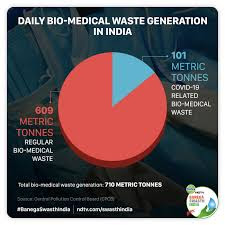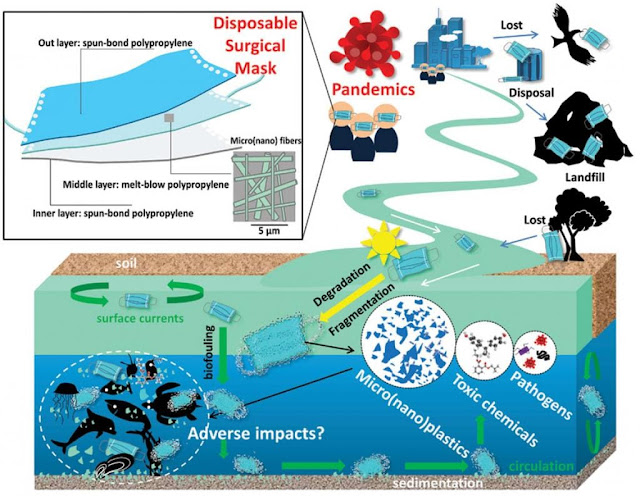Face Mask: An Emerging Medical Waste
Face Mask: An Emerging Medical Waste
 |
| Credits-https://www.oakbaynews.com/wp-content/uploads/2020/12/23615832_web1_201212-VNE-FaceMasks-Oceans-pollution_2-1024x683.jpg |
Now-a-days wearing masks has become a global requirement to stop spreading of COVID-19, although they do have a drawbacks. As the mask made of TNT(Trinitrotoluene) which is practical and cheap but which are not designed to washed and requires 400-450 years to break down.
Face mask is an emerging infectious medical waste which is characterized as any material that is suspected to contain pathogens in sufficient concentration or quality to cause disease in susceptible host. hence, it is harmful to health.
Infectious waste generated by COVID-19 outbreak becoming a major environmental and health concern in many countries. Each minute of the day we tend to throw away 3 millions of face mask. Recent studies estimate that we use 129 billion face mask globally every month, most of them are disposable face masks made from plastic microfibers. according to studies human corona virus can remain alive on inanimate hard surface like metal, glass and plastic for up to 9 days.
With increasing reports on inappropriate disposal of face mask it is urgent to recognize this potential environment threat and prevent it from becoming the next plastic problem.
- Techniques For Disposal of Used Face Mask-
{MASK ARE TREATED AS MEDICAL WASTE}
There are different types of mask are available in the market and these used mask posses different germs, viruses and bacteria with different survival rate. The used mask posses respiratory secretions of infected person when they left untreated and get exposed to environment, they can be dispersed and transmitted through air. It may cause hazardous effect on lives. hence the infected mask should be disposed with proper techniques according to their type as follows:
caution: Hand should be washed before and after taking off the mask.
Don't share your mask with anyone.
During studies, it is found that the total medical waste generated in Asia is around 16,659.48 tons/day. India is the highest medical waste generating country that is around 6,491.49 tons/day.
- MEDICAL WASTE MANAGEMENT DURING COVID-19 PANDEMIC-
COVID-19 outbreak has increased medical waste and causes a global emergency and social as well as economic concern in addition to excessive medical and household waste, which adversely affects municipal waste management and leads to environmental issues. If the waste not managed properly, it may leads to spread of virus.
 |
| Schematic presentation of medical and household waste management during COVID-19 outbreak Credits-https://images.app.goo.gl/UG593ErbrDtxNFnR6 |
Disposal management of face masks during the COVID-19 pandemic in India-
- Quarantined homes or other households: used face masks are kept in a paper bag for 72 hours before disposal as general waste.
- Face masks straps are cut before disposal to prevent reuse.
- Greater Chennai Corporation (GCC) has advised non-quarantined homes and residents to dispose used masks by disinfecting them with ordinary bleach solution (5%) or sodium hypo-chloride solution (1%). Masks are wrapped and kept in a closed bin before provision to the sanitary workers. They are treated as domestic hazardous waste and incinerated by GCC.
Existing practices for infectious waste separation, storage, transportation and disposal in India-
- Use dedicated trolleys and collection bins in COVID-19 isolation wards, laboratories and test centers. Use masks are discarded and collected in separate 'yellow color-coded plastic bags' (suitable for biomedical waste collection) labelled 'COVID-19 Waste.'
- Disinfect inner and outer surfaces of containers, trolleys and bins with 1% NaCIO solution daily.
- Depute dedicated sanitation workers for biomedical and general solid waste collection and timely transfer to temporary storage.
- Use vehicles with GPS and bar-coding systems for containers containing HCW for waste tracking. label vehicles with 'Bio-hazard' sign.
2. COVID-19 Waste treatment and disposal-
- Common biomedical waste treatment facility (CBWTF).
- Disposal permitted by deep burial only in rural or remote areas without CBWTF facilities.
- Large volume of yellow colored-coded (incinerable) COVID-19 waste beyond the capacity of existing CBWTFs and BMW incinerators, necessitates permitting HW incinerators usage at existing treatment, storage and disposal facilities (TSDFs) or captive industrial incinerators if any exist in the state/ union territory. In such cases, ensure separate arrangement for handling and waste feeding.
COVID-19 is pathogenic virus and the concerned authorities should pay significant attention to all aspects of prevention and control. Standardization, procedures, guidelines and strict implementation of medical waste management for the COVID-19 pandemic should be carefully considered to reduce the risk of the pandemic spreading to the environment within hospitals, community residences and public areas.
I hope that the above information helpful to enhance your knowledge and aware you about emerging face mask waste management issues. These information worth asking for your time investment.
Thank you!







Good👍👍
ReplyDeleteNice information 👍
ReplyDeleteWell said👌
ReplyDeleteNice thinking
ReplyDeleteThanks
DeleteNice Thinking and Good Information 👌👍
ReplyDeleteNice& Good information
ReplyDeleteThanks
ReplyDelete👌
ReplyDeleteNice information 👍
ReplyDeleteVery Good..Too much informative for current situation
ReplyDeleteThanks a lot..
DeleteGreat awareness for upcoming waste issues
ReplyDelete👍
ReplyDeleteNice & good information 👍
ReplyDeleteNice.. important envirnmental ecus
ReplyDeleteGreat and important information about enviromental issue
ReplyDeleteThank you..
Delete👍👍
ReplyDelete🙏
DeleteNice information
ReplyDeleteGreat and very IMP information.
ReplyDeleteImportant information...Well explained
ReplyDeleteThanks..
ReplyDeleteNice information
ReplyDeleteThanks..
DeleteGreat...nice information..
ReplyDeleteGreat...nice information..
ReplyDeleteAwesome 👍
ReplyDeleteGreat information👍
ReplyDelete